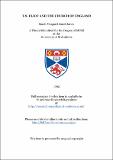Files in this item
T.S. Eliot and the Church of England
Item metadata
| dc.contributor.author | Jarvis, Sarah Margaret Janet | |
| dc.coverage.spatial | ix, 275 p. | en_US |
| dc.date.accessioned | 2018-07-09T14:24:23Z | |
| dc.date.available | 2018-07-09T14:24:23Z | |
| dc.date.issued | 1992-07 | |
| dc.identifier.uri | https://hdl.handle.net/10023/15137 | |
| dc.description.abstract | After his conversion to the Church of England in 1927, Eliot's sense of obligation towards the Church and its concerns was paramount in his life and work. His association with Anglicanism has been discussed by such commentators as Helen Gardner, Roger Kojecky and John Margolis, but no recent critic has examined Eliot's comprehensive devotion to the Church. New evidence made public within the last twenty years allows us to see more accurately how the influence of the Church of England predominated after 1927 in Eliot's verse, drama, and criticism. This thesis proceeds to look at Eliot's influential position among the Anglican intelligentsia. The fellowship of this circle heightened Eliot's ideals of communion through cultural exchange and ritual. Eliot's relationship with the Church of England provides a crucial context for the examination of his life and writings after 1927. | en_US |
| dc.language.iso | en | en_US |
| dc.publisher | University of St Andrews | |
| dc.subject.lcc | PR6009.L6Z5J2 | |
| dc.subject.lcsh | Eliot, T. S. (Thomas Stearns), 1888-1965 | en |
| dc.subject.lcsh | Church of England--History--20th century | en |
| dc.subject.lcsh | Eliot, T. S. (Thomas Stearns), 1888-1965--Influence | en |
| dc.title | T.S. Eliot and the Church of England | en_US |
| dc.type | Thesis | en_US |
| dc.type.qualificationlevel | Masters | en_US |
| dc.type.qualificationname | MPhil Master of Philosophy | en_US |
| dc.publisher.institution | The University of St Andrews | en_US |
This item appears in the following Collection(s)
Items in the St Andrews Research Repository are protected by copyright, with all rights reserved, unless otherwise indicated.

